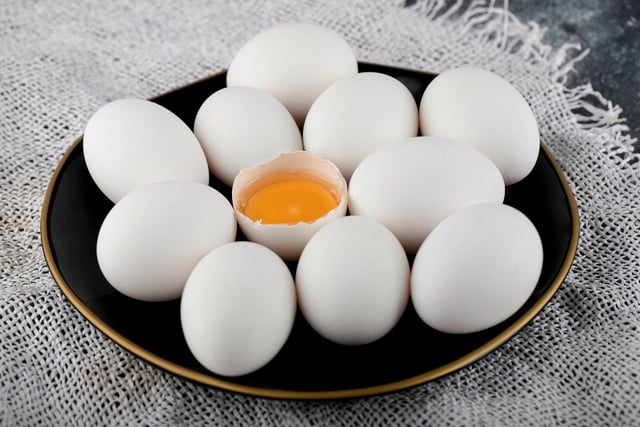Specialist Doctor 1 Nguyen Thu Ha, FPT Long Chau Pharmacy System, said that in the context of more and more people paying attention to a healthy diet, understanding the nutritional value of each type of food becomes more important than ever. Duck eggs, although a popular food, are often overlooked when it comes to providing high-quality protein.
Duck eggs, although a popular food, are often overlooked when it comes to providing high-quality protein.
Photo: Freepik
How much protein is in a duck egg?
According to data from the US Department of Agriculture (USDA), an average duck egg weighing about 70g (including the shell) contains about 9-10g of protein. This number can vary depending on the size of the egg and the way it is raised. Compared to chicken eggs (average 50g, containing about 6-7g of protein), duck eggs are clearly superior in protein content, with a difference of about 1-2g/egg. This is the reason why duck eggs are often the preferred choice of bodybuilders or those who need to supplement protein.
The protein in duck eggs is distributed in both the egg white and yolk, but in different proportions:
Egg white: Accounts for about 60% of the total protein in eggs, mainly albumin - a protein that is easily digested and absorbed.
Yolk: Contains the remaining protein (about 40%), along with fat, vitamins and minerals.
So if you only eat the whites to cut calories, you'll still get most of the protein, but you'll miss out on other nutrients from the yolk.
What nutrients do duck eggs have besides protein?
In addition to protein, duck eggs are also a nutritional “treasure” that few people pay attention to. Below is a table of basic nutritional components of 1 duck egg (70 g), based on data from the USDA and the National Institute of Nutrition of Vietnam.
Calories: 130 - 140 kcal; Fat: 10 g (mainly from yolk); Vitamin A: 10% of daily requirement (RDI); Vitamin B12: 20% of RDI; Iron: 8% of RDI; Zinc: 6%; Choline: About 200 mg (very important for the brain).
Health benefits of protein in duck eggs
Protein from duck eggs not only helps you feel full for a long time but also brings many great benefits. Here are the outstanding effects:
Building and maintaining muscle: The protein in duck eggs provides essential amino acids, especially leucine, which helps stimulate muscle synthesis. With 9-10g of protein per egg, this is an excellent source of protein for gym-goers or athletes who need to recover muscles after exercise.
Immune system support: Protein is the “raw material” for the body to produce antibodies and immune cells. Combined with zinc and vitamin B12 in duck eggs, your immune system will be significantly strengthened.
Good for the brain thanks to the combination of protein and choline: Choline - a nutrient abundant in duck eggs - plays an important role in maintaining brain function, improving memory and reducing the risk of cognitive decline.
Healthy adults can eat 1-2 eggs/day
Photo: AI
How many duck eggs is enough?
Dr. Thu Ha said, healthy adults: 1-2 eggs/day, equivalent to 18-20 g protein from eggs. Children (6-12 years old): 1 egg/day, combined with other protein sources such as meat, fish. Bodybuilders: 2-3 eggs/day, depending on total protein target (usually 1.6-2.2 g protein/kg body weight). Elderly people: 1 egg/day to supplement nutrition without putting pressure on the kidneys.
However, people with heart disease or diabetes should limit their intake of egg yolks because of their high cholesterol, which can increase the risk of plaque buildup in the arteries. Consult your doctor if you fall into this category. For balance, you can combine duck eggs with green vegetables, whole grains or fruits rich in fiber.
Notes when processing duck eggs
According to Dr. Thu Ha, duck eggs are a nutritious food source, providing about 9-10g of high-quality protein per egg, along with essential micronutrients such as vitamin A, B12, selenium and choline. However, to optimize the absorption of nutrients, especially preserving the structure and bioavailability of protein, the processing method plays a key role.
Boil or steam. Boiling or steaming eggs is the preferred choice for those who want to maintain the full nutritional value of their diet. These methods not only help to preserve the protein structure, but also minimize the loss of micronutrients due to high temperatures or grease. Boiling duck eggs for about 10-12 minutes is considered the ideal time for the yolk and white to cook evenly, while ensuring food safety without reducing the biological value of the protein.
Limit frying with large amounts of oil. Frying eggs, especially when using large amounts of oil or oil that has been reused many times, not only increases the total energy (calories) of the dish but also denatures proteins and creates oxidized compounds that are not beneficial to health, especially for people with cardiovascular disease or who are controlling their weight. In addition, the frying process can cause some loss of water-soluble vitamins such as B2 and B12.
Source: https://thanhnien.vn/mot-qua-trung-vit-co-bao-nhieu-protein-luu-y-gi-khi-che-bien-18525040423313564.htm

































![[Photo] National Assembly Chairman Tran Thanh Man visits Vietnamese Heroic Mother Ta Thi Tran](https://vphoto.vietnam.vn/thumb/1200x675/vietnam/resource/IMAGE/2025/7/20/765c0bd057dd44ad83ab89fe0255b783)

































































Comment (0)